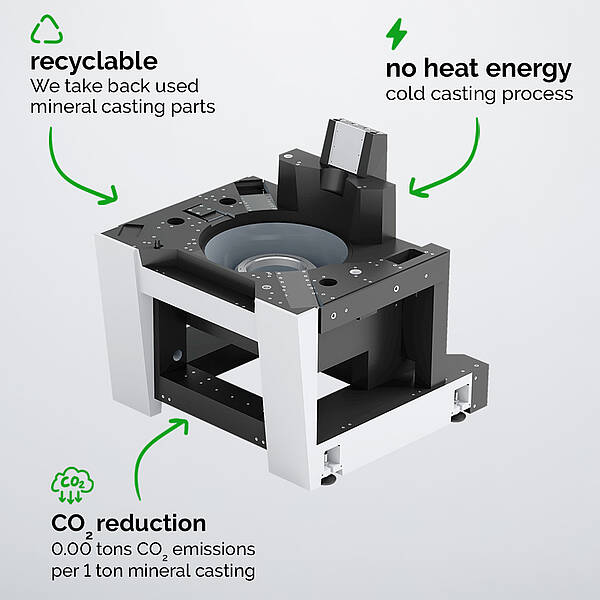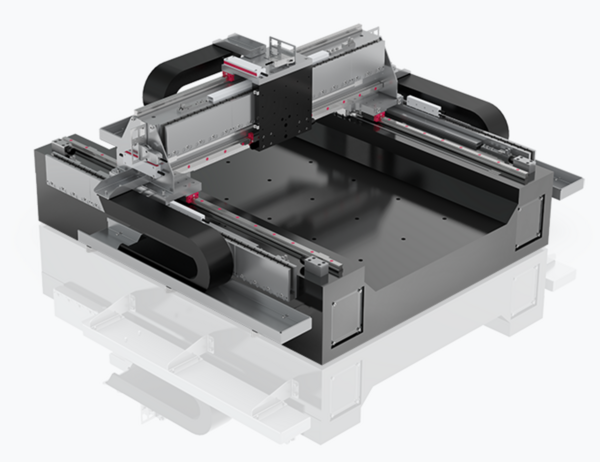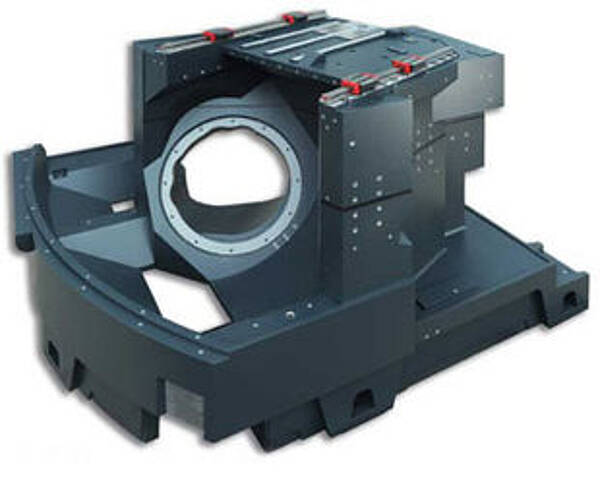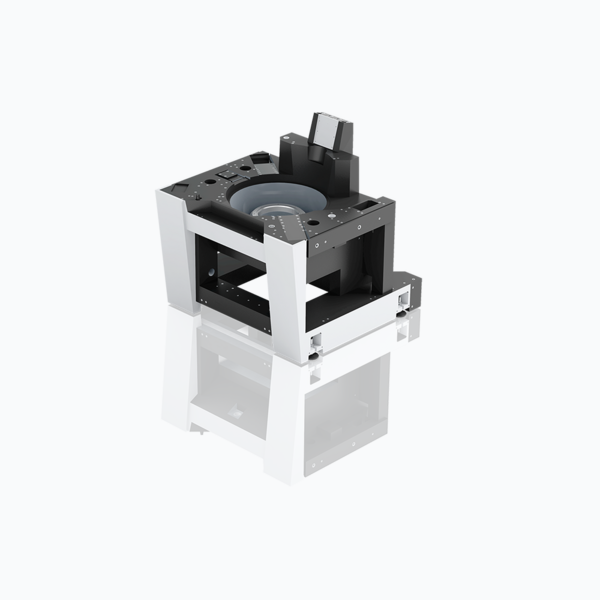Mineral Cast Solutions for Vibration-Free and Eco-Friendly Performance.Eliminate Vibration for Greater Production Machinery Speed and Precision -- While Committing to Sustainability
The Challenge:
As manufacturing equipment, electronic devices, and medical instruments require ever-higher precision, the machinery that makes these products must deliver significantly greater speed and accuracy. One of the factors holding back greater machinery performance is the cast iron and steel used in their Machine Beds and foundations, which works to amplify the vibration generated during operation. The casualties: Greater speed and accuracy.
The Solution:
Mineral casting technology which, when employed in Machine Beds and foundations, delivers exceptional vibration damping, chemical resistance and environmental sustainability. First introduced for use in the bases and platforms of metal grinding machines, today mineral-cast foundations are being applied and making new and innovative applications possible in electronics, medical devices, solar, and packaging equipment.
Mineral casting is a cold-casting process -- meaning it does not require any additional heat for its manufacture. What's needed is generated during the process
itself -- by an exothermic reaction between the chemical components.
The bottom line for the environment is this: Mineral cast technology saves energy and promotes sustainability.
Mineral cast machine foundations require significantly less energy in their manufacture than what is required to produce gray cast iron or steel bases -- significantly reducing CO2 emissions. And those savings impressively total 1.6 tons of CO2 emissions per tonne of mineral casting produced per year versus steel and cast-iron production.
As an added environmental bonus, our mineral-cast products are fully recyclable -- with SCHNEEBERGER accepting its mineral-cast components for certified recycling.

Mineral casting is the ideal material for the Machine Bed, machine supporting structures and foundations where dynamic and highly precise movements are required. The technology uses a proprietary cold-casting process that mixes several sizes of quartz stone (16 mm to powder size) into a matrix. The matrix is bonded with a small amount of epoxy, placed into a mold, and solidified. The result is an exceptionally hard quartz stone-based material. Mineral cast products weigh about the same as aluminum and are three times lighter than steel. They exhibit low heat conductivity and chemical and corrosion resistance.
Depending on the OEM's requirements, the casting can be designed with threaded inserts and precision and coated surfaces. This flexibility makes it easy to integrate components, sensors, instruments, and connections within the machine's foundation. Mineral casting provides machine builders with a ready-to-use product that shortens their processing times and accelerates final product assembly.
All mineral cast products are built to the OEM customer's design. At a best-practice supplier, such
as SCHNEEBERGER, the company's engineering department reviews the design, builds the mold, and develops the technology definition. The vendor's mineral casting specialists and applications engineers will suggest methods to improve performance and reduce cost while evaluating the OEM's design.
Mineral casting is the ideal material for the Machine Bed, machine supporting structures and foundations where dynamic and highly precise movements are required. The technology uses a proprietary cold-casting process that mixes several sizes of quartz stone (16 mm to powder size) into a matrix. The matrix is bonded with a small amount of epoxy, placed into a mold, and solidified. The result is an exceptionally hard quartz stone-based material. Mineral cast products weigh about the same as aluminum and are three times lighter than steel. They exhibit low heat conductivity and chemical and corrosion resistance.
Depending on the OEM's requirements, the casting can be designed with threaded inserts and precision and coated surfaces. This flexibility makes it easy to integrate components, sensors, instruments, and connections within the machine's foundation. Mineral casting provides machine builders with a ready-to-use product that shortens their processing times and accelerates final product assembly.
All mineral cast products are built to the OEM customer's design. At a best-practice supplier, such
as SCHNEEBERGER, the company's engineering department reviews the design, builds the mold, and develops the technology definition. The vendor's mineral casting specialists and applications engineers will suggest methods to improve performance and reduce cost while evaluating the OEM's design.
A pharmaceutical packaging company experienced problems with its blister packing machines. The equipment was unable to accurately position the blister pack's layers, wasting a significant amount of aluminum foil and slowing the machine's operation. The company commissioned the production of a new blister packing machine with three mineral-cast bases that held all of the packaging line's equipment.
320 cast-in parts (pneumatic piping, water tanks, bonding wires, etc.) were pre assembled in the bases. Because of the mineral cast components' ability to eliminate vibration, the packaging machine could operate at extremely high speed and precisely position the aluminum and paper layers of the blister pack.
Discover how mineral casting technology revolutionized efficiency and precision in pharmaceutical packaging, drastically reducing material waste and production time.
To the resultWhile the application of mineral casting started with grinding machines, the technology quickly spread across the high precision machine tool industry. These applications included beds for large machining centers, side pieces for gantry machining, and structures for demanding 5-axis machining systems.
Today, OEMs are incorporating mineral casting products in a wide variety of industries such as semiconductors, packaging, electronics, optical instruments, medical technologies, food, and flat-panel instrumentation.
Discover Mineral Cast Products

Design engineers cannot achieve high speed and micron level accuracy without eliminating Machine Bed vibration. Mineral casting technology's exceptional damping properties are up to 10 times better than steel or cast iron solving the vibration problem. The result is exceptional dynamic stability for the machine structure that enables highspeed operation with much greater precision.
An optical company produced 85 mm-diameter lenses for eyeglasses and microscopes. The firm's production process included individual milling, grinding, polishing, and checking machines. Temperature and pressure fluctuations were creating vibration and movement in the machines' hydraulic and electrical lines. This motion resulted in increased maintenance that caused machine downtime and higher costs.
The optical firm decided to integrate all four processes into one machine using a mineral cast base. This platform provided space for all the machine's internal components, plus 42 pneumatic and hydraulic lines. The mold also included the indentations and wiring and piping holes for the internal components. The mineral cast base was delivered pre-assembled with 284 cast-in parts.
Discover how mineral casting technology drastically reduced maintenance, minimized machine downtime, and boosted production efficiency by integrating multiple processes into a single machine in optical lens manufacturing.
To the resultThe production of steel machine bases and tables has become expensive due to the rising energy and production costs of steelmaking. In addition, these products must be cut, milled, polished, painted, and drilled adding considerable expense.
Mineral casting uses a stone-based material that does not require energy or additional processing to construct the product. In many instances, the mineral cast components are molded to final dimensions with virtually no contraction during hardening. This process achieves costs savings of up to 30 percent compared to steel and iron castings. It also results in faster production cycles and shorter lead times than alternative materials.
Because products are cast to final form, designers enjoy exceptional freedom with respect to component shapes. The technology enables the production of products weighing from 80 grams to 30 tons. The material's characteristics allow for unconventional processes such as bonding, which in turn permits the creation of complex product structures. Wiring and piping holes and spaces can be cast in and around the machine.
The material is easily milled and does not require the costly processing required by steel and iron castings. The freedom and flexibility to shape designs make the material ideal for small applications such as medical devices and laboratory equipment.

Mineral casting is the ideal material for machine supporting structures and foundations where dynamic and highly precise movements are required in production, and support for a company's ESG commitment is unwavering.